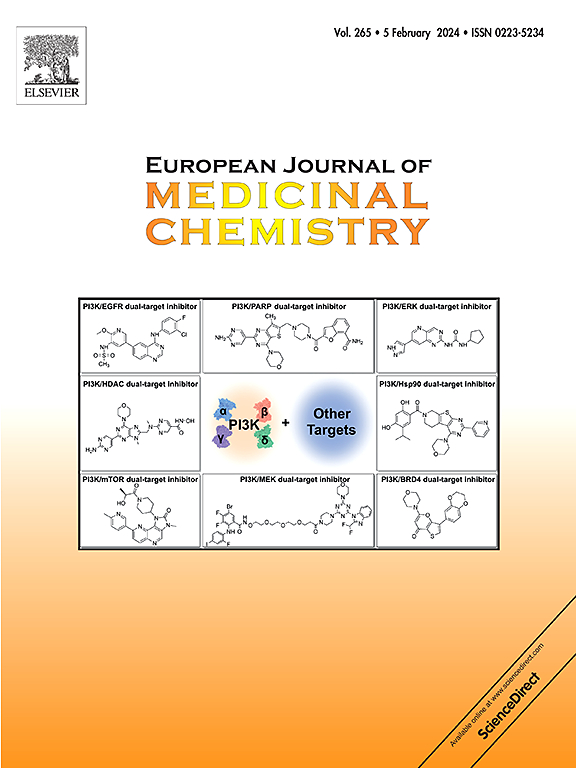Design and synthesis of pyridine-based benzamides as potent HDAC3 inhibitors as an armament against breast cancer with in vivo validation
IF 6
2区 医学
Q1 CHEMISTRY, MEDICINAL
引用次数: 0
Abstract
Some novel benzamide derivatives with modified linker group were designed and synthesized as promising HDAC3-selective inhibitors. These compounds exerted promising antiproliferative potential compared to reference molecule CI994 while tested against several cancer cell lines. Notably, all these molecules exhibited nontoxicity towards normal human cell lines. The most promising molecule in series 7c exhibited ∼47-fold HDAC3 selectivity over HDAC2 isoform. Compound 7c induced apoptosis and cell cycle arrest in the G2/M phase in the 4T1 cell line. Moreover, compound 7c yielded a good in vivo pharmacokinetic profile. Notably, compound 7c markedly reduced tumor growth in the 4T1-Luc breast cancer xenograft model in female Balb/c mice. Compound 7c also upregulated apoptotic proteins namely caspase-3, caspase-7, and cytochrome c, and downregulated Bcl-2. The antitumor potential of compound 7c was further justified by the downregulation of EGFR and Ki-67 through Western blot analysis. Nevertheless, the HDAC3 inhibitory potency of compound 7c depicted strong and stable binding interaction at the HDAC3 active site. These findings validated that compound 7c is a promising HDAC3 inhibitor that can be further investigated for clinical translation to achieve emerging breast cancer therapeutics.


吡啶基苯酰胺作为HDAC3有效抑制剂的设计与合成,并在体内验证
研究人员设计并合成了一些具有修饰连接基团的新型苯甲酰胺衍生物,作为有前景的 HDAC3 选择性抑制剂。与参考分子 CI994 相比,这些化合物在针对几种癌细胞系的测试中表现出了良好的抗增殖潜力。值得注意的是,所有这些分子对正常人细胞系均无毒性。系列中最有前途的分子 7c 对 HDAC3 的选择性比对 HDAC2 同工酶的选择性高出 47 倍。化合物 7c 可诱导 4T1 细胞株凋亡并使细胞周期停滞在 G2/M 期。此外,化合物 7c 还具有良好的体内药代动力学特征。值得注意的是,化合物 7c 显著降低了雌性 Balb/c 小鼠在 4T1-Luc 乳腺癌异种移植模型中的肿瘤生长。化合物 7c 还能上调细胞凋亡蛋白,即 caspase-3、caspase-7 和细胞色素 c,并下调 Bcl-2。通过 Western 印迹分析,表皮生长因子受体(EGFR)和 Ki-67 的下调进一步证明了化合物 7c 的抗肿瘤潜力。尽管如此,化合物 7c 对 HDAC3 的抑制效力表明其与 HDAC3 活性位点的结合作用强且稳定。这些发现验证了化合物 7c 是一种很有前景的 HDAC3 抑制剂,可以进一步研究其临床应用,以实现新兴的乳腺癌疗法。
本文章由计算机程序翻译,如有差异,请以英文原文为准。
求助全文
约1分钟内获得全文
求助全文
来源期刊
CiteScore
11.70
自引率
9.00%
发文量
863
审稿时长
29 days
期刊介绍:
The European Journal of Medicinal Chemistry is a global journal that publishes studies on all aspects of medicinal chemistry. It provides a medium for publication of original papers and also welcomes critical review papers.
A typical paper would report on the organic synthesis, characterization and pharmacological evaluation of compounds. Other topics of interest are drug design, QSAR, molecular modeling, drug-receptor interactions, molecular aspects of drug metabolism, prodrug synthesis and drug targeting. The journal expects manuscripts to present the rational for a study, provide insight into the design of compounds or understanding of mechanism, or clarify the targets.

 求助内容:
求助内容: 应助结果提醒方式:
应助结果提醒方式:


